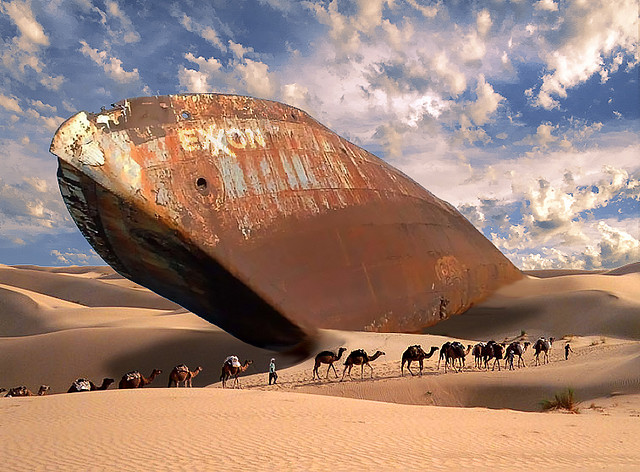Podcast: Play in new window | Download
Subscribe: RSS
Britain’s leading oil scientists — including the man who for years prepared BP’s in-house estimate of future world oil supplies — have concluded that peak oil is here. In a special issue of the journal of the Royal Society, they argue that the era of cheap oil is over, and that an era of rising prices, recessions, famines and resource conflicts is beginning. In this global context, they dismiss the so-called shale oil “revolution” in the United States as insignificant and short-lived. The story, whose implications for our immediate future cannot be overstated, was reported by London’s Guardian newspaper and virtually nowhere else in the general media.
The scientists analyzed “official figures” put out by government and international agencies, and concluded that global production of conventional oil has been flat since 2008 and is now declining at a rate of just over 4% a year. This despite cries of “oil boom” in the United States and dramatically increased oil “reserves” around the world. (The words enclosed in quotation marks in this paragraph may be replaced with the word “lies.”) As the scientists point out, you can claim all the reserves you want, but if you can’t get the oil to market no one can use it. Dr. Richard G. Miller, the retired BP geologist, calls it the “ATM problem” — you might have tons of money in the bank, but you can only withdraw a limited amount per day through an ATM machine.
Discussions of the petroleum business have been deliberately confused in recent years by changing definitions of “oil.” If you just look at the crude brought to market by conventional means, the situation is both clear and dire — prices have tripled since 2004, doubled since 2010. But of late, oil moguls have talked instead about oil “liquids,” including natural gas and tar-sands products, that require expensive and unsustainable methods of production such as hydraulic fracturing of tight, or shale oil.
These products are not to be relied on, says another recent UK study, by the Energy Research Council, because “the resource base appears relatively modest,” and the decline rate of fracking wells is hideously fast — “90% or more in the first five years.”
World oil production has been at the level of about 80 million barrels a day since 2008. To keep it there (and keeping it at that level would not address the problem of rampant growth in demand in China and India, for example) would require, says Dr. Miller, “new production equal to a new Saudi Arabia every 3 to 4 years.”
It’s not going to happen.
The US shale oil “revolution” will flame out in just a few years. “There absolutely will not be enough tight oil production to replace the US’ current 9 million b/d of imports,” says Dr. Miller. Thereafter, the decline of oil will become ever more precipitous even as the demand for it becomes more voracious.
“We’re like a cage of lab rats,” says the former BP executive, “that have eaten all the cornflakes and discovered that you can eat the cardboard packets too. Yes, we can, but…”
[For more on the subjects of oil production and fracking, check out the “Energy” category.]

Oil is a non-replenishable natural resource that technological systems have been irreversibly using up in recent times. That is the stark physical realty.The article is only a wake up.call to a society addicted to the benefits of using oil without taking into account the ecological cost.